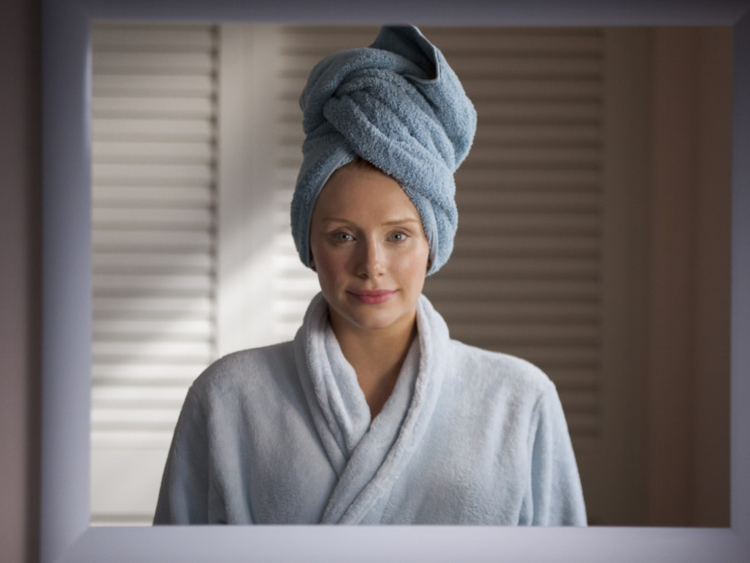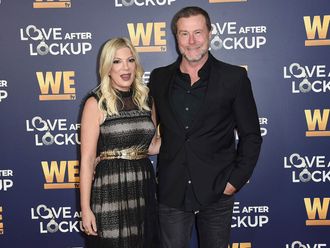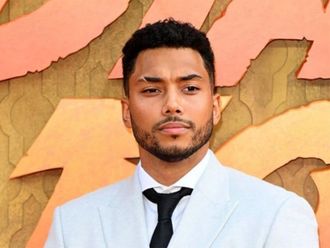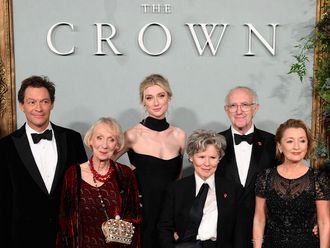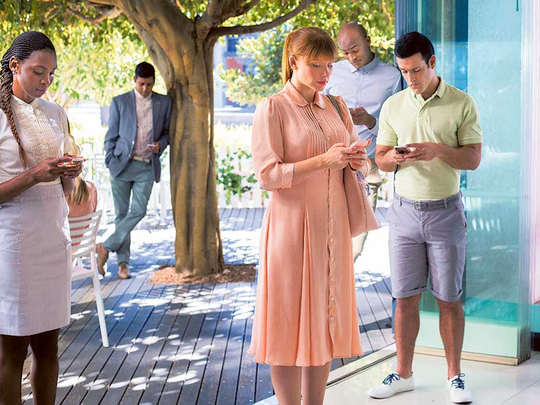
What if there were Yelp for people? How far would you go to keep the private information on your computer from your friends and family? What if you could kill a villain with a tweet? The modern-era Twilight Zone series Black Mirror is back, asking all the uncomfortable questions that its audience delights and dreads.
The nail-biting, gut punch of an anthology series returned to Netflix on October 21 with twice the number of episodes. That means six soul-rattling stories set in alternate sci-fi realities.
Created by Charlie Brooker, the first two three-episode seasons of Black Mirror originally aired on Channel 4. But the show’s popularity and the timely manner of each narrative attracted Netflix’s attention.
The Black Mirror buzz spread to stateside actors such as Jon Hamm, who starred in the Christmas special, and Robert Downey Jr, who optioned the first season episode, The Entire History of You, for a film. After picking up the past two seasons of Black Mirror and airing them for American audiences, the streaming service outbid Channel 4 for Season 3.
We spoke with executive producer and writer Brooker and executive producer Annabel Jones on the grim future that the show will undoubtedly present this season.
Did casting Jon Hamm in the Christmas special bring out the American audience?
Annabel Jones: I think it was more Netflix that changed everything. When the show went to Netflix US, probably just under two years ago, it suddenly gave us a whole new audience. It has attracted more American casts, more American directors. That ability that Netflix gives you to just [have] the show sit there and wait for people to find [it] is just so perfect for an anthology show where it’s all word of mouth if you don’t have a big marketing campaign. Netflix was the game changer.
Charlie Brooker: It’s interesting, because when Jon came on board ... it was just before it went out ... I don’t know how he had seen it. People had passed him surreptitious DVDs of it or something. He said that by the time he’d wrapped on [the Black Mirror Christmas special], suddenly it had gone on Netflix and people were certainly discussing it. There was a spike in interest in the show. It’s the perfect platform for an anthology show. We blow up the world basically at the end of each story.
On a streaming platform like Netflix, you can come to them in any order; it just feels like the natural home for it, really. We’ve approached it like a film festival.
Jones: I think we were surprised how much it has resonated around the world. I suppose it was very arrogant of us to assume that it wouldn’t because all of the things are very universal. Suddenly, you have a platform that is in every territory, and so everyone can watch it easily, and that’s what you want as a filmmaker, just people to be able to find your films as quickly and as easily as possible.
Brooker: And also you’ve got freedom in terms of running times and you don’t have to cut sequences around ad breaks and things like that. One of our stories this time around is feature length, for instance, which we couldn’t have done so easily before.
Has the global attention changed the series?
Brooker: I think there’s probably a slight upscaling in ambition. I don’t know how much of that is to do with just getting more confident in what we are doing.
Jones: I think maybe getting some of the episodes not set in the UK as well, and so therefore that gives it slightly more ambition. They’re not all sort of small, domestic British tales. Two of them are set in the US, but we actually filmed them in South Africa. Don’t tell anyone.
Booker: One is set in Scandinavia.
Jones: And then the other three are set in Britain.
It’s easy to jump around, but in the first season, most folks started with The National Anthem, the really difficult episode about the prime minister and the pig. It’s really brutal. Was that an intentional jumping-off point?
Brooke: I wish I could say, and I am going to name drop now, but Steven Soderbergh said to me that it reminded him of the beach scene in Saving Private Ryan in that it was a good way of clearing out anyone who wasn’t in for the long haul. It was like, ‘Bam!’ you do that at the start.
It came about because it was something that always amused me. It was an idea that I’d had for quite a while... a celebrity being blackmailed into having sex with a pig. Starting out, I approached it like I was going to write a parody episode of 24.
Then, when you start approaching it, and you’re thinking about the modern-day backdrop and the Black Mirror world that we were trying to set up and create in that tone, the straighter we played it, the more disturbing it was. It was interesting, when we first had the press screening of that, when you watch it with a live audience, they react like the public did in the story, where they start off laughing and then by the end they are all upset, which was, mission accomplished.
Jones: It was quite bold. It set up the template for the series that was a challenging drama, things that aren’t being dramatized and things that are going to entertain but hopefully be thought-provoking as well.
Brooker: Also, I always really loved catching episodes of anthology shows where you couldn’t believe what you were [watching]. I remember reading what somebody said about The Texas Chainsaw Massacre, that the really unsettling thing about that is you feel like it was made by maniacs. When you’re watching, you’re quite worried about what you’re watching. So it felt like opening [with The National Anthem episode] was a pretty good statement of intent.
Having said that, we’ve got quite a variance in tone throughout these [new] six stories. We have not skimped on the darkness at all, but there’s other aspects to it. We’ve got an episode set in 1987; we’ve got a police procedural episode which is 90 minutes long; we’ve got a war-military-tech story; we’ve got a romance/blackmail thriller; we’ve got a social satire; we’ve got Dan Trachtenberg’s episode — it’s kind of a horror romp with a video gaming theme.
Jones: Some of them are more of a love story...
Brooker: Wistful.
Jones: Hopefully they are all evoking different reactions and emotions but all through a slightly warped prism on the world.
Joe Wright, who directed Pride and Prejudice and Pan, worked on an episode this season. He has a very interesting and light aesthetic. What are we going to see from his contribution to Black Mirror?
Brooker: That’s the episode with Bryce Dallas Howard and Alice Eve, and that is a satire on social anxiety, identity and social media, which makes it sound very dry. It’s an almost dream-like atmosphere that’s evoked in that, and it’s a very, very strong vision. It’s kind of like a pastel nightmare, cheerful, smiley.
Netflix has been touting this season as bigger and badder than all the previous seasons. Do you feel like that’s true?
Jones: [The episodes] are challenging, but they are also very real. That’s something that’s very important to us. We want them to be, some of them, high concept, but we always try and make them feel very real and credible so that you have that personal engagement, you have that emotional journey.
Are we going to see current hot topics such as Gamergate or Donald Trump touched on in the season?
Brooker: We didn’t foresee Trump, although I guess, arguably, we did with the Waldo episode. We do have a story that is explicitly dealing with an online expression of rage. We don’t tend to look at the news and then come up with a story. Often, it’s usually we’re just discussing some kind of human dilemma, which I often find hilarious, and then we realise that that latches on to something that is in the ether.
Could you elaborate a little more on expressing anger online?
Brooke: There’s a police procedural story where there is a thread that runs through it that has to do with social media and anger. It’s called Hated in the Nation. It’s a police story of police folk in the near future.
Don’t miss it!
Black Mirror is now streaming on Netflix.



